The Future of Dhaka’s Metro Rail Network: Exploring Upcoming Lines
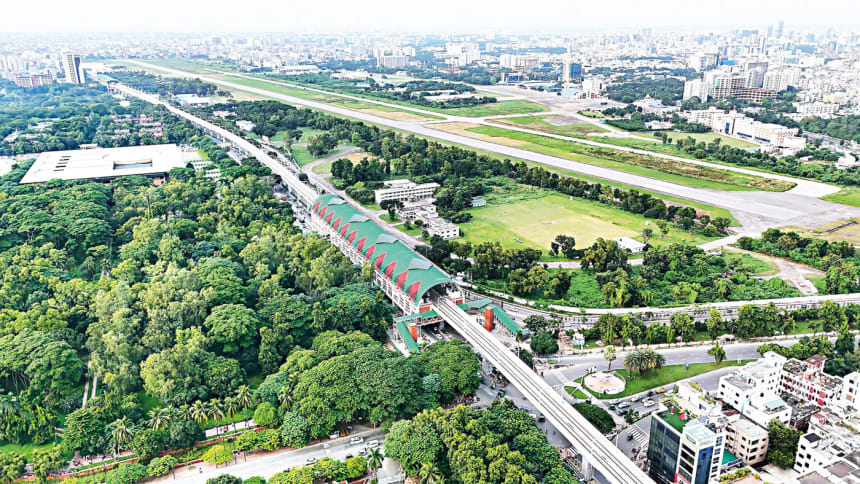
The government is moving forward with the mega plan to build a 140-kilometer metro rail network in Dhaka and its adjacent areas by 2030 to reduce traffic congestion and pollution, two major problems the city of 2 crore people is facing severely.
Once the planned network consisting of six lines comes into reality, 50 lakh people will be able to use the facilities. However, Dhaka dwellers might have to wait beyond 2030 to have the full metro rail network functional.
With the maiden metro rail line coming into full operation tomorrow, Dhaka dwellers might have to wait for four to five more years to get the second metro rail in operation.
Physical work on the second metro rail line, formally known as Mass Rapid Transit Line-1, the first underground metro rail line in the country, started early this year. The project's deadline is 2026, but it may take two more years beyond the deadline to complete due to a delayed start.
The prime minister will formally inaugurate the construction work of the country's third metro rail, MRT Line-5 (northern route), today, and the project's deadline is 2028.
After the completion of a feasibility study, other preparatory work for the fourth line, MRT Line-5 (southern route), is currently underway. However, the project has not been approved yet.
However, the authority could not even start the feasibility study of two other lines, MRT Line-2 and MRT Line-4, and the preliminary alignment of both lines has been changed. So, it would take a long time to start physical work, even if the lines are found feasible.
However, MAN Siddique, managing director of Dhaka Mass Transit Company Ltd, the implementing and operating agency, said that they were hopeful about implementing their plan within 2030.
"We have completed MRT Line-6 [the first metro rail] even before the deadline. So, we will be able to complete building the network within the deadline [2030]," he told The Daily Star on Wednesday.
MRT LINE-6: COUNTRY'S FIRST METRO RAIL LINE
Approved in December 2012, the 20.10-kilometer line from Uttara to Motijheel was supposed to be completed by June 2024. It took six years and three months of physical work to open the 12-kilometer Uttara-Agargaon section in December last year.
The prime minister will open the Agargaon-Motijheel section today. The 1.16-kilometer Motijheel-Kamalapur section, which was added in 2020, is scheduled to be completed by December 2025. The project cost rose to Tk 33,472 crore, about 11,487 crores more than the original estimate.
MRT LINE-1: COUNTRY'S FIRST UNDERGROUND METRO RAIL
This is the first underground metro rail line in the country and the biggest infrastructure project in the transport sector, involving Tk 52,561.43 crore. Out of the 31.24km line, a 19.87km section from Hazrat Shahjalal International Airport to Kamalapur will be underground. The other part, an 11.36km stretch from Notun Bazar to Purbachal, will be elevated. There will be 19 stations for the two parts.
The project was approved in October 2019, and as per the original plan, its physical work was supposed to start in December 2020. However, it got delayed mainly due to coronavirus restrictions, and the work finally started in February this year. The construction work began with developing land for a depot at Pitalganj, Narayanganj. A Japan-Bangladesh joint venture company has been hired for building the depot.
Contracts for only one out of 12 packages have been signed so far. The authorities earlier announced that they would start the underground work by January next year. But Project Director Abul Kashem Bhuiyan said, "We hope to start underground work by the end of this fiscal year as one of the packages saw better progress."
If the authorities want to meet the 2026 deadline, they will have only three years to do it. However, DMTCL sources said the contract period for each of the packages for underground works would be five years, making it impossible to complete the work within the deadline. Besides, a document from the Japan International Cooperation Agency, which will provide 70 percent of the cost in soft loans, shows the line is expected to be opened in 2028.
MRT LINE-5 (NORTHERN ROUTE): FIRST EAST-WEST METRO CORRIDOR
The project approved in October 2019 is to build a 20km rail line from Savar's Hemayetpur to Bhatara via Gabtoli, Mirpur, and Gulshan. The rail line with 14 stations will have underground and elevated sections. Like MRT-6 and 1, this line will also be implemented with Japanese soft loans.
Prime Minister Sheikh Hasina will formally inaugurate the construction work of the 41,239-crore project from a program at Motijheel Metro Station today. However, physical work on the line has already started on July 16 with the beginning of land development for its depot at Hemayetpur. On May 23, DMTCL hired a joint venture firm of TOA Corporation of Japan and Spectra Group of Bangladesh for the work at the cost of Tk 1,189 crore. The project deadline is 2028, but contracts for only one out of 10 packages have been signed so far. A document from Jica, which will provide 70 percent of the cost in soft loans, said the line is expected to be opened in 2029.
MRT-5 (SOUTHERN ROUTE): FIRST METRO RAIL PROJECT TO BE FUNDED OTHER THAN JAPAN
The DMTCL has conducted a feasibility study for the fourth line, MRT Line-5 (southern route), funded by the Asian Development Bank (ADB). The planned 17.3-kilometer line starts from Gabtoli and ends at Dasherkandi via Kalyanpur, Shyamoli, Asad Gate, Russell Square, Panthapath, Karwanbazar, Hatirjheel, Rampura, and Aftabnagar. It will have 15 stations with mostly an underground section. The preliminary estimated cost of the project is Tk 47,940 crore. The estimate was made considering $1= Tk 95, but currently, $1= Tk 111, meaning the project cost would be much higher than the previous estimate.
Contacted, Project Director Abdul Wahab said they have re-submitted the Development Project Proposal (DPP), which is now pending with the Planning Commission. He said both ADB and South Korea have expressed interest in financing the project, with ADB as the lead financier. The Economic Relations Division (ERD), on behalf of the government, will make the decision in this regard. Asked when the project could be approved, he said, "It's not possible to say right now. However, we are doing advance procurement works so that we can go for final procurement after the project's approval." The deadline of the project is 2030.
MRT LINE-2: THE LONGEST METRO RAIL LINE
The proposed MRT Line-2 project faced a major setback last year after the authorities changed the way it would be financed and implemented. It was supposed to be implemented under the Government-to-Government (G2G) PPP (Public Private Partnership) model with Japan. But the metro authorities now want to implement it under a government initiative because they found the conditions given by Japan's company unacceptable. The authorities also changed the preliminary alignment of the line. The line was supposed to be 24km from Gabtoli to Chattogram Road via Mohammadpur, Nilkhet, Azimpur, Central Shaheed Minar, Gulistan, Motijheel, Kamalapur, Mugda, and Demra. But, as per the new alignment, the line would be extended up to Narayanganj. It would have an extended part from Gulistan to Sadarghat, taking its total length to 35km, making it the longest metro rail line. Physical work for the line was slated to start in 2024, but the finance-related changes are likely to cause more delays. Currently, metro rail authorities are searching for financiers to carry out a feasibility study of the project.
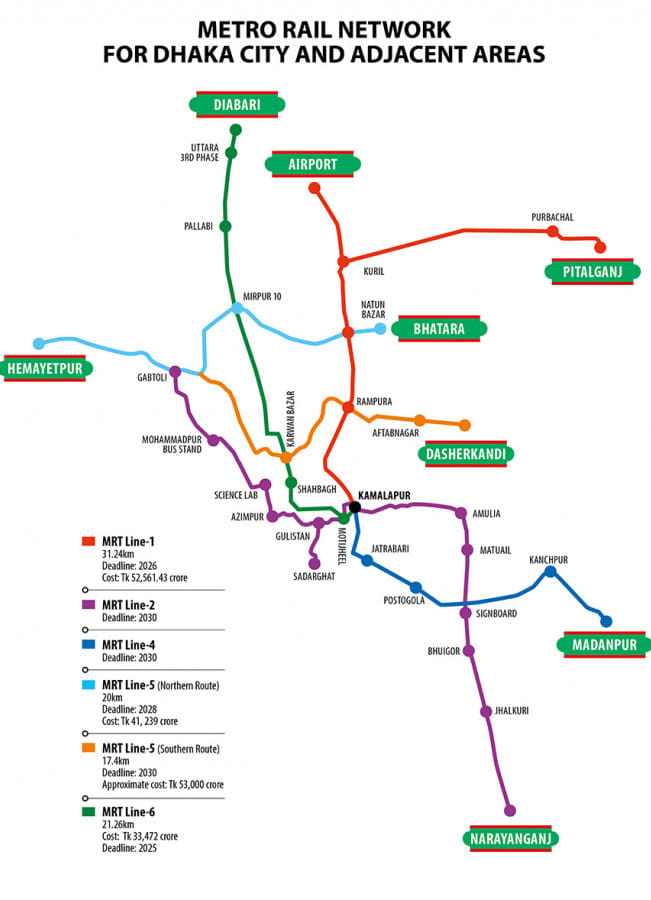
MRT LINE-4: THE LINE TO CONNECT DHAKA'S OUTSKIRTS
As per the preliminary plan, the line was supposed to run from Kamalapur to Narayanganj underground. But metro rail authorities changed the plan as Bangladesh Railway is expanding the Dhaka-Narayanganj rail line. Its new alignment would be from Dhaka to Madanpur in Narayanganj via Signboard. The 16-kilometer line will have both underground and elevated sections. The authorities are looking for funds for a feasibility study. Contacted, DMTCL MD MAN Siddique said South Korea, among others, has expressed interest in financing studies for MRT-2 and 4.

 For all latest news, follow The Daily Star's Google News channel.
For all latest news, follow The Daily Star's Google News channel. 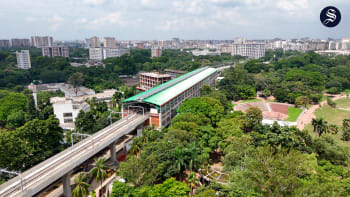


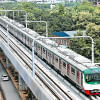

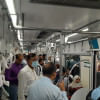



Comments